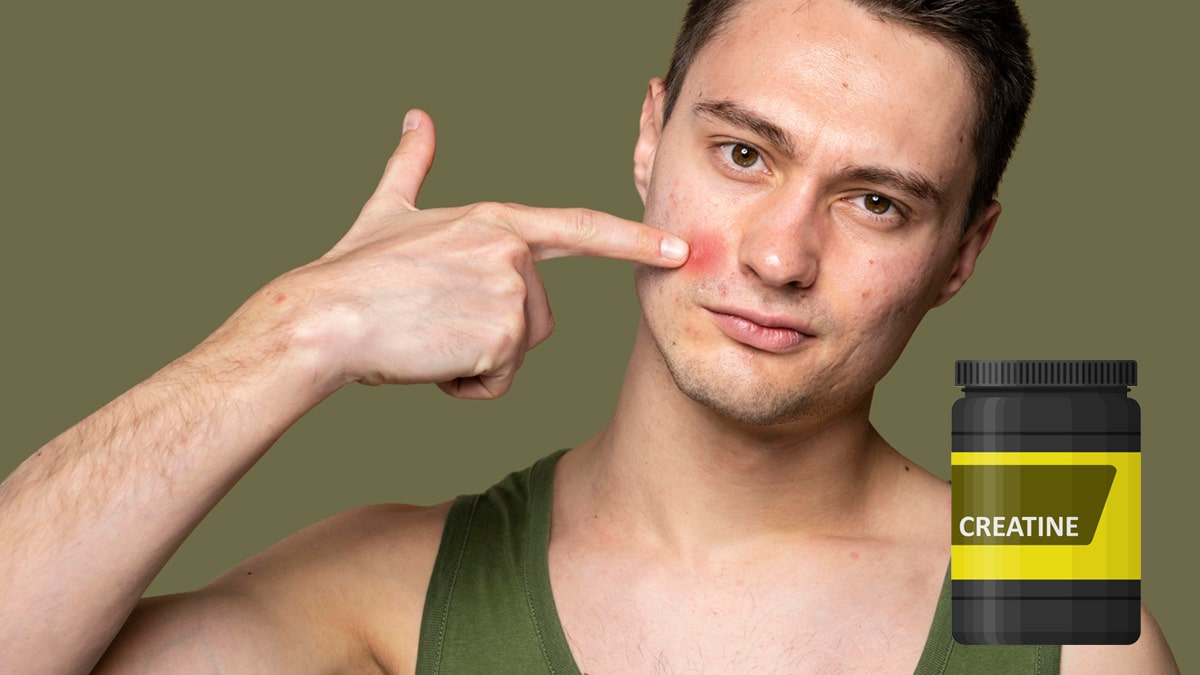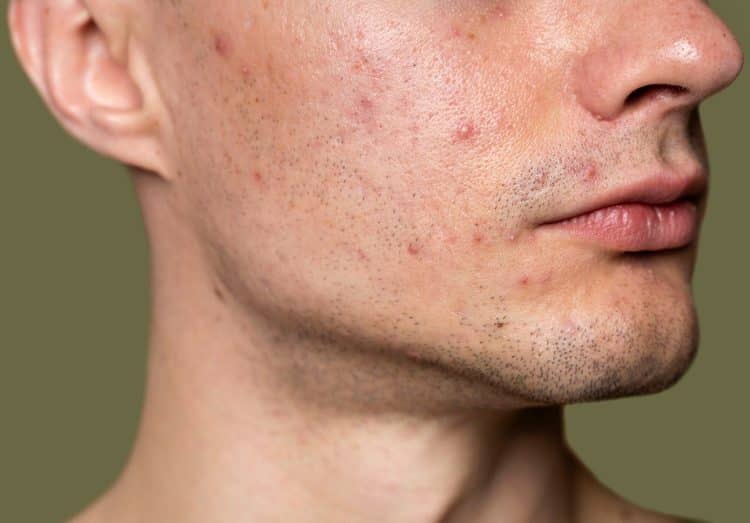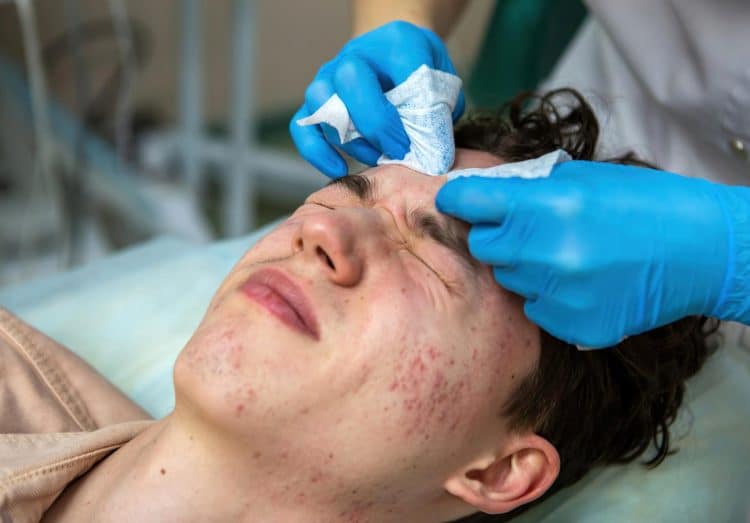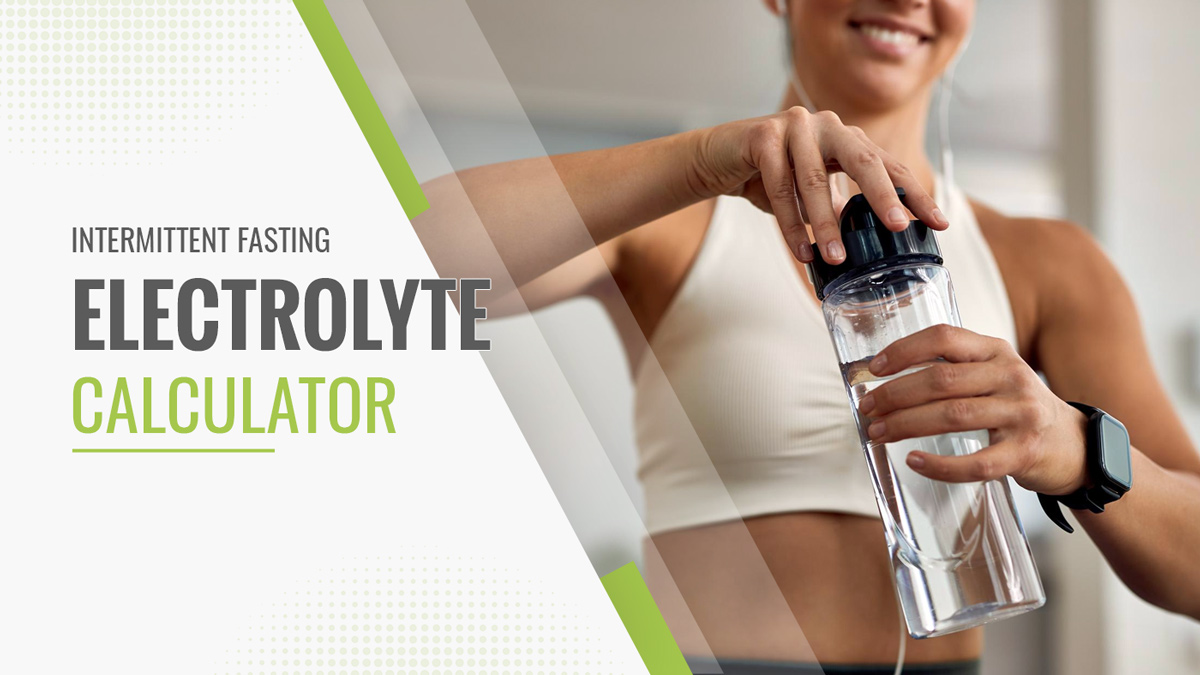Supplements can be a great way to ensure you get the nutrients your body needs, especially if your diet lacks certain foods. Creatine is one supplement that can provide fantastic health benefits when taken in the appropriate dosage and combined with the proper fitness routine and a healthy lifestyle. However, there have been a lot of discussions around whether creatine supplementation leads to acne.
Acne is a common skin problem faced by a large population, often triggered by certain underlying health conditions. While there could be several causes of acne, there’s a belief that taking creatine supplementation aggravates acne. If you are planning to take creatine but feel unsure about its side effects, this article has you covered.
We have tried to delve into the details of the creatine composition to understand its possibility of causing facial pimples.
The Role of Creatine in Your Body
It is essential to know what creatine is all about to understand the correlation between creatine and acne. In simple words, creatine is an amino acid derivative typically consumed as a supplement by people seeking to enhance their athletic performance.
The main purpose of creatine is to shuttle water into your cells. Creatine consumption increases your ATP production, enabling you to push harder for longer, and reduces recovery time between sets when training at the gym. Be it to add on more reps or sprint a tad faster on the track, it can boost your body’s endurance and strength when fed with an appropriate amount of creatine.
Creatine is made naturally in your muscles, allowing the body to produce energy, especially during high-intensity workouts. It is also produced by your body from glycine and arginine and stored in the muscles as phosphocreatine, just like amino acids.
Creatine is available in different forms, and it isn’t difficult to find a variety of creatine supplements on the market. However, creatine monohydrate is the most commonly consumed form of creatine, and this compound enhances muscles and retains water in cells enabling that pump-up effect, among several other benefits. [1]
Creatine and Acne: Facts and Myths
Now that you know a little about creatine, here’s more on whether or not it can cause acne. If you were to look up scientific studies, there is no evidence to prove that creatine can directly cause acne.
However, some people report acne breakout experiences after supplementing with creatine. So, then does creatine cause acne? While some instances indicate that creatine could indirectly trigger acne, it cannot be said that every person taking creatine will be subject to experiencing a facial acne outbreak.
Testosterone could be one of the acne contributing factors. That’s because as you consume creatine, the testosterone levels in your body are likely to shoot up, possibly causing conditions that lead to acne. Notably, all these are possibilities and not proven facts.
On the other hand, higher testosterone levels are necessary for people trying to build strength and muscle mass.
Understanding Creatine to Know if it Causes Acne
No clear evidence or research directly correlates creatine supplementation with acne. However, creatine can affect your body in many ways and indirectly influence any underlying acne problems.
Depending on your pre-existing health and skin conditions, using a creatine supplement can result in a fluctuation or increase in the levels of certain hormones in your body. With creatine impacting dihydrotestosterone (DHT) and IGF-1 levels, you may experience indirect acne outbreaks if someone is genetically susceptible to it. Several research studies indicate that people consuming creatine supplements witness an increase in their DHT levels by almost 50%. [2]
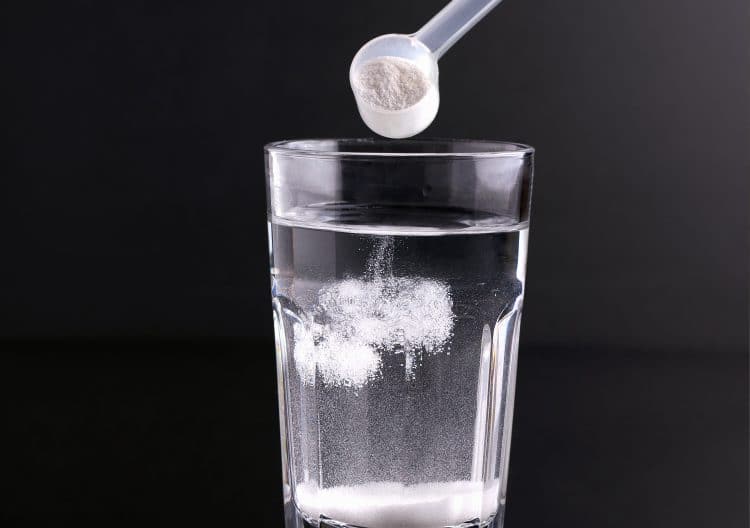
Considering the sensitivity of hormones, this could mean that people naturally prone to hormone-driven acne are at a higher risk of an acne outbreak when taking creatine.
However, it is essential to understand that DHT is a byproduct of testosterone and automatically increases in your body when additional creatine is ingested. This increase in DHT levels in the body has been linked to acne. Moreover, it can also trigger hair loss. [3]
Sticking to a recommended creatine dose is essential as higher levels can increase the risk of developing acne. Most guidelines suggest not to exceed your creatine intake, especially when taking it regularly.
Consuming between 3-5 grams of creatine is considered normal. For sports athletes seeking immediate effects, the amount often shoots up to 10 grams. You can use the creatine calculator to check your specific dosage requirements.
Decoding DHT and Acne with Science
Scientifically speaking, DHT can bind itself to androgen receptors on your oil glands, causing additional oil production. In such situations, the glands get overtly stimulated, preventing the skin cells from shedding correctly. It causes trapping of the sebum underneath, leading to inflammation over a period.
As DHT levels increase, they stimulate the sebaceous glands and can cause acne in some people. However, not everyone will experience such an outbreak, as it has been observed that people with a history of acne are more prone to it. [4]
Testosterone and Acne
Testosterone is a hormone found in both men and women. This hormone plays a crucial role in developing an individual’s sexual organs and muscle mass. It also contributes heavily to bone density. Akin to DHT, high testosterone levels in your body can result in extra sebum production, thereby increasing the risk of inflamed sebaceous glands over time and eventually causing acne.
Teenagers, irrespective of sex, experience acne breakouts during puberty due to high testosterone levels. However, a similar experience of creatine up-surging testosterone production to build muscle mass is often experienced by adults while using creatine supplements. Also, such supplements can increase the risk of dehydration as creatine increases water retention in your muscles. [5]
Neglecting to treat the skin can lead to acne breakouts, dry patches, and dullness. Dehydrated skin can also be oily. A lack of adequate water can cause the skin to look rough and dry, leading it to compensate by producing excessive oils.
Hence, the process elevates the level of dead skin cells that can clog your pores. However, the risk of dehydration when taking creatine can be minimized by drinking enough water throughout the day. Moreover, reducing the consumption of coffee can help you control dehydration.
How To Treat Acne Outbreaks?
Whether or not you take creatine, acne can continue erupting now and then. While you take care of your water intake and diet, you can also add a healthy skincare routine to maintain acne-clear skin. Naturally derived cosmetics such as concealers, tinted moisturizers, and gel cleansers can come to the rescue.
Benefits of Creatine Consumption
Whether you are an athlete, bodybuilder, or someone who wants to boost your muscles, creatine can be a viable option. Creatine can work wonders in building muscle mass, decreasing fatigue and tiredness, reducing blood sugar levels, improving performance during high-intensity workouts, and enhancing brain functions.
Creatine Boosts Energy
A creatine supplement can provide instant energy with the help of adenosine triphosphate. From stimulating muscle growth to reducing the chance of cell damage, creatine supplements can also improve muscle blood flow while pumping more oxygen for your high-intensity training regimens. [6]
Acts As Brain Fuel
Creatine can improve mental activity, cognitive function, and memory in healthy individuals. With its ability to increase levels of certain chemicals in the brain, creatine can assist in the regular functioning of brain cells, as suggested by some studies in the field. [7]
Can Work As Anti-Ageing Agent
Well, with all that debate around creatine and acne, it might surprise you that creatine can be used as a remedy for skin aging. Studies indicate that the topical application of creatine can treat wrinkles and boost skin collagen, making your skin look firmer. [8]
Using creatine with caution poses lesser risks. Also, if you’ve had an experience with acne, you may want to use a regulated dosage of creatine supplement or not use it until the benefits outweigh the possible risks for you.
For those who have acne and are currently taking creatine, you might need to monitor how your skin responds to a creatine supplement. On the other hand, if you have clear skin and aren’t sure if creatine could cause a breakout, you can add the supplement to your existing diet without regulating anything else to check how your skin responds to the supplementation over a few weeks or months.
Tips To Prevent Acne with Creatine Consumption
Here are a few tips to improve your experience supplementing with creatine:
- Try taking a shower after your workout session. Sweat, dust, and dirt accumulation can cause oil build-up, making it a breeding ground for acne-causing bacteria. However, keeping your skin clean can prevent this.
- Restricting sugar in your diet can also reduce the risk of acne. Consuming sugary beverages or excessive energy drinks can often cause acne.
- Keep yourself hydrated as creatine can cause dehydration and skin irritation, increasing the risk of bacterial infections and acne. Creatine metabolism helps your skin feel good and reduces the risk of bloating and weight gain.
- It is best to avoid excessive alcohol and caffeine-rich beverages when taking creatine to prevent further dehydration. Also, minimizing food high in saturated fats or leucine can reduce the chances of developing acne. [9].
FAQs
Is creatine only for weightlifters or athletes?
No. Anyone who wants to improve their fitness level, especially strength, muscle mass, and endurance, can use creatine supplements. It is recommended to consult a physician before using a new supplement, especially if you are dealing with some health issues.
Can a woman take creatine to build lean muscle?
Yes. Women can take creatine to build lean muscles. Creatine can enable higher energy levels through periods of intense training.
Can I take creatine if I have acne?
Creatine is purposed to enable muscle mass and strength but may cause higher testosterone levels and DHT. An increase in these hormones may not necessarily cause an acne breakout, although some people experience pimple outbreaks upon taking creatine. You can always consult your health professional to rule out such possibilities.
Will I look fat with creatine?
No, creatine will not make you fat. Creatine builds muscle mass, which makes them look bigger. Initially, it increases muscle water retention, which may cause some individuals to look or feel bloated.
Learn more about Creatine:
- The 5 Supplements Worth Taking (And Another Five That Aren't)
- Creatine Before and After: How Creatine Supplement Affects Your Body
- I’m a Supplement Researcher — These 3 Creatine Forms Will Supercharge Your Gains (and One’s a Total Rip-Off)
- STOP Wasting Your Creatine! The Ultimate Guide to Proper Usage
- How Long Does Creatine Stay in Your System? A Doctor Explains
- What Happens To Your Body When You Take Creatine Every Day For Muscle Gain?
- Creatine + Whey Synergy: The Science Behind This Power Duo's Muscle-Building Magic
- The Creatine Paradox: Does This Muscle Builder Really Make You Gain Weight?
Wrapping Up
Not everyone who takes creatine is bound to experience increased acne levels. As experts suggest, it is best to stick to recommended doses of creatine and accordingly make adjustments if you experience any adverse effects in your body.
Those interested in increasing strength and endurance or other mental benefits using creatine can surely give creatine monohydrate a try. Moreover, a proper diet and hydration routine can enhance the advantages of creatine.
References
Fitness Volt is committed to providing our readers with science-based information. We use only credible and peer-reviewed sources to support the information we share in our articles.
- Creatine Monohydrate ais.gov.au
- Antonio, Jose, et al. “Common Questions and Misconceptions about Creatine Supplementation: What Does the Scientific Evidence Really Show? – PMC.” PubMed Central (PMC), 8 Feb. 2021.
- Swerdloff, Ronald S., et al. “Dihydrotestosterone: Biochemistry, Physiology, and Clinical Implications of Elevated Blood Levels – PMC.” PubMed Central (PMC), 2 May 2017
- Three weeks of creatine monohydrate supplementation affects dihydrotestosterone to testosterone ratio in college-aged rugby players – PubMed. (2009, September 1). PubMed.
- “Creatine: MedlinePlus Supplements.” Creatine: MedlinePlus Supplements. Accessed 13 Sept. 2022.
- “Creatine Supplementation Enhances Anaerobic ATP Synthesis during a Single 10 Sec Maximal Handgrip Exercise – PubMed.” PubMed, 1 Feb. 2003.
- “Effects of Creatine Supplementation on Cognitive Function of Healthy Individuals: A Systematic Review of Randomized Controlled Trials – PubMed.” PubMed, 15 July 2018.
- “Dermal Penetration of Creatine from a Face-Care Formulation Containing Creatine, Guarana and Glycerol Is Linked to Effective Antiwrinkle and Antisagging Efficacy in Male Subjects – PubMed.” PubMed, 1 Dec. 2011
- Pappas, Apostolos. “The Relationship of Diet and Acne: A Review.” PubMed Central (PMC), Accessed 13 Sept. 2022.
Tip: If you're signed in to Google, tap Follow.


